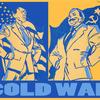Brian A. Horne is a doctoral candidate in anthopology at the University of Chicago, where he studies media, music and popular culture. He is currently finishing his dissertation examining efforts to perpetuate and preserve an influential Soviet-era musical genre known as bardic song in contemporary Moscow. His chapter, "The Bards of Magnitizdat: An Aesthetic Political History of Russian Underground Recordings" will appear this summer in the volume, "Samizdat, Tamizdat, and Beyond: Transnational Media During and After Socialism." Brian shares his rants about staggeringly self-undermining advertisements occasionally in his blog, badvertised.blogspot.com.
Brian Horne appears in the following:
Warm Feelings for a Cold War
Thursday, January 31, 2013
In her book “The Future of Nostalgia,” Svetlana Boym reminds readers that nostalgia was originally a medical condition. The word was coined by Swiss doctor Johannes Hofer in the late 17th century. He used it to describe a debilitating disease that plagued its victims with depression, obsessive thoughts of returning home, and hallucinations of scenes from their homeland and the voices of distant loved ones. Populations especially at risk of contracting nostalgia included displaced workers, students from foreign lands, and of particular concern, soldiers fighting abroad. Boym explains that “[i]t was unclear at first what was to be done with the afflicted soldiers who loved their motherland so much that they never wanted to leave it, or for that matter to die for it.”
Today, of course, nostalgia is no longer a battlefield illness. Instead, curiously, nostalgia manifests itself among many Americans as a longing for wartime.
In Defense of Noise
Wednesday, October 10, 2012
Last week’s episode of OTM featured an interview with Nate Silver discussing some of the central themes and ideas in his new book,The Signal and the Noise: Why So Many Predictions Fail but Some Don't. Silver suggests in the book’s introduction that the problem of discerning signal from noise is one of particular importance in an age of “Big Data,” an era of increasingly powerful publishing and communications technologies. “[If] the quantity of information is increasing by 2.5 quintillion bytes per day,” he writes, “the amount of useful information almost certainly isn’t. Most of it is just noise, and the noise is increasing faster than the signal.”
The Loudness Wars
Wednesday, September 19, 2012
Back in December of 2010, OTM reported on the passage of “CALM,” the Commercial Advertising Loudness Mitigation Act, by the U.S. Congress. The act requires broadcasters to measure and regulate the loudness of the commercials they air in very particular ways so that a program with dramatic whispered dialogue isn’t interrupted suddenly by blaring advertisements. It’s been more than a year since CALM was approved, and that means there’s not much time left before the FCC begins enforcing a new set of loudness rules on broadcasters. If all goes well, by December 13th, 2012, audiences will be spared harsh and jarring transitions into and out of commercial breaks. But is there no one who will speak up in defense of blaring “Sunday, Sunday, Sunday!” advertisements before they’re muffled?
On Siri (or “Operator? I Hardly Know Her!”)
Thursday, September 13, 2012
Brian Horne assesses the complicated relationship that iPhone users have with "personal assistant" Siri and what she (it?) hearkens back to.
On Max Headroom
Friday, May 25, 2012
This week OTM reflects on a night twenty five years ago when two Chicago television stations' broadcasts were interrupted by the someone posing as the fictional computer generated host “Max Headroom.” But of all the faces available to hide behind, why Max Headroom's? What was it about a disembodied computer program that appealed to the Chicago signal hijacker?




